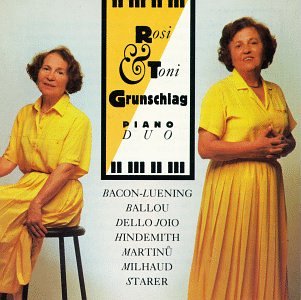I had never heard of the Rosi & Toni Grunschlag Piano Duo until I stumbled across this disc in a second-hand bin. Naturally I couldn’t resist, so I plunked down my 99 cents, brought the disc home, put it on, and was absolutely smitten by the sisters’ remarkable performances of wide-ranging 20th-century duo fare. Originally issued by CRI, these 1981/’91 recordings have been available from New World for some time, either in physical CDR format or via digital download.
Rosi and Toni Grunschlag were Austrian musical prodigies, along with their violinist brother David. With the rise of the Nazis David emigrated to Israel in 1935, helped by his mentor Bronislaw Hubermann. David later played with the Philadelphia Orchestra from 1959 until his retirement in 1984. A year after the Anschluss the sisters managed to leave Austria, and eventually made their way to New York in 1939. In 1945 they formed a piano duo at the suggestion of New York Times critic Olin Downes. They continued concertizing and teaching up until their deaths (Toni in 2007, Rosi in 2012). The sisters were subjects of a remarkable and unforgettable documentary film directed by Will Wyatt and Todd Murray.
More importantly, their artistry consistently conveys fervent commitment and impeccable ensemble values. Their limpid control of the proto-minimalist repeated phrases and witty imitative exchanges in the “Glockenspiel” movement of Hindemith’s Sonata for Two Pianos renders other performances dry and bland by comparison. They lightly romp through Milhaud’s colorful Les Songes, and bring out the samba-like implications in Dello Joio’s Toccata.
It takes a few hearings to make narrative sense of the reticent lyricism and refined cluster chords dominating Robert Starer’s Sonata for Two Pianos, yet one can’t imagine a more persuasive and characterful performance. The sisters totally let loose in Martinu’s wildly notey Fantasie, and play up the acerbic ragtime aura of the Bacon/Luening collaboration with idiomatic joy. However, I keep returning to the dense polyphony, restless ideas, and elusive tunefulness of Esther Williamson Ballou’s two-movement Sonata from 1949. Superficially you might describe the music as Paul Bowles rewritten by Hindemith, yet Ballou’s individual voice always comes through. Who knew that a serendipitous thrift store bargain would yield a priceless treasure?
































